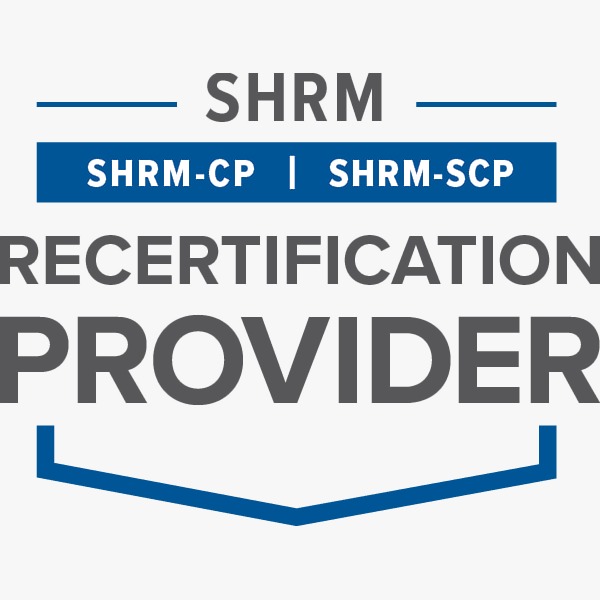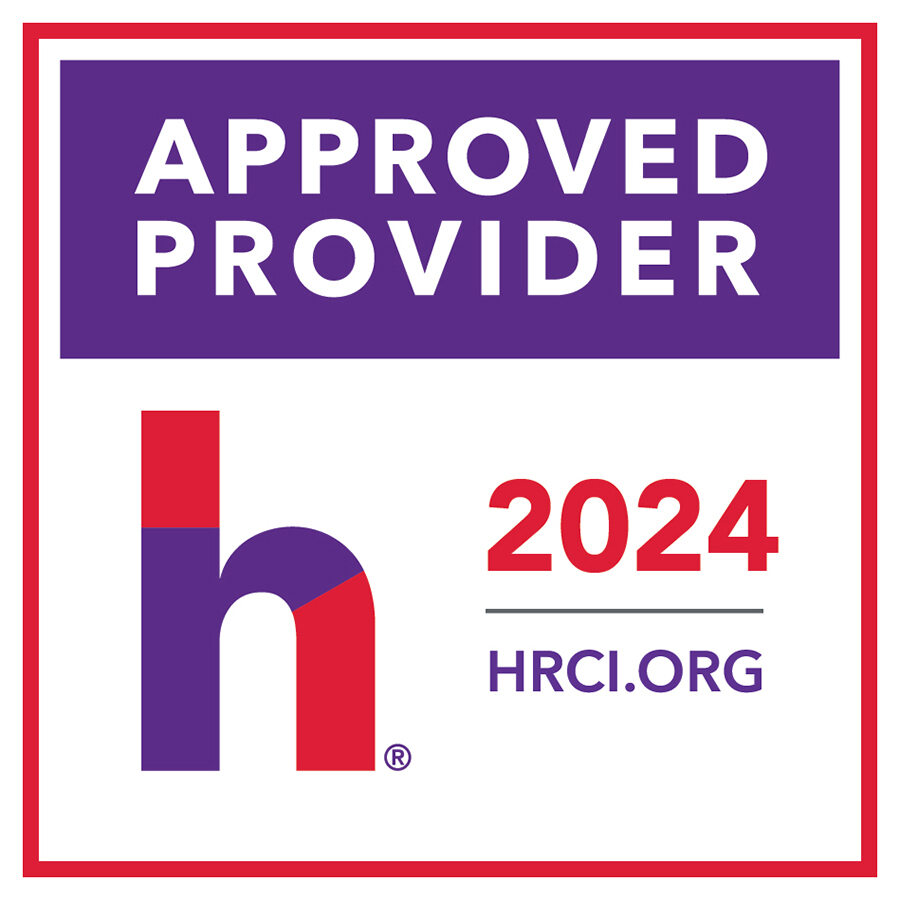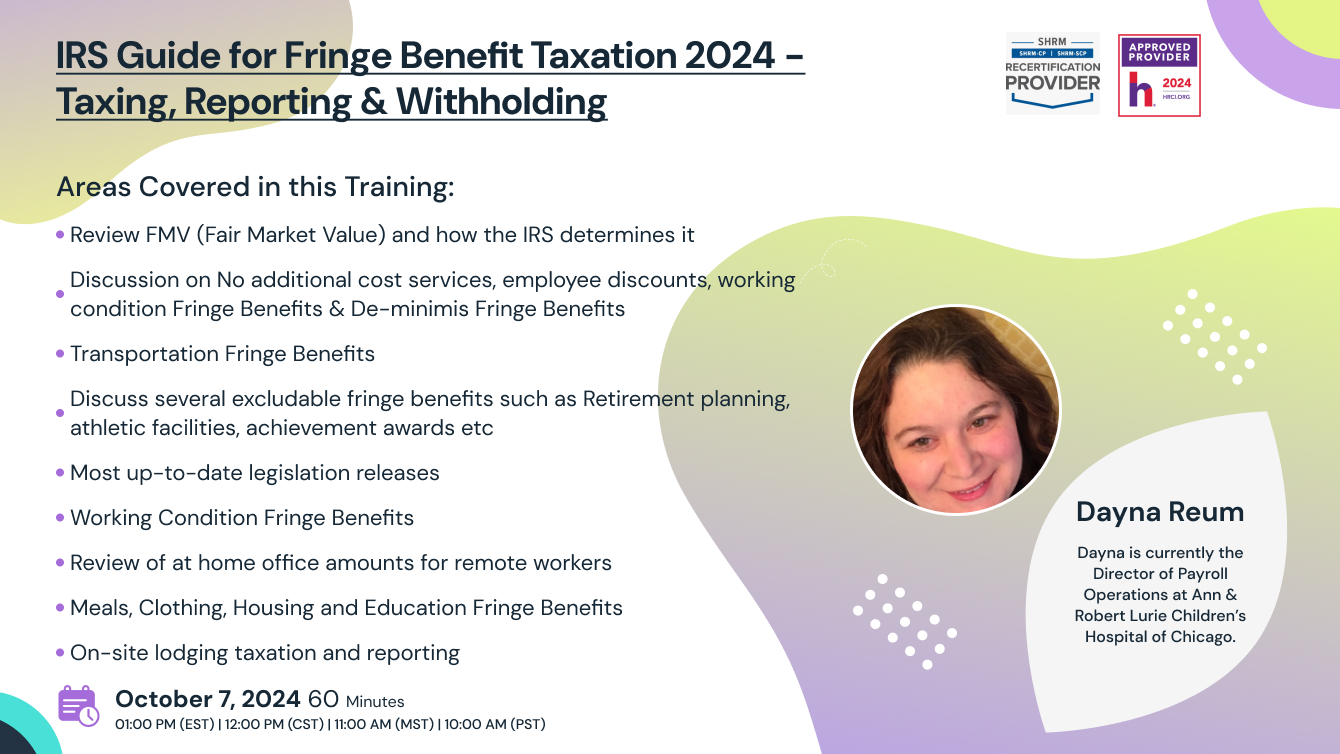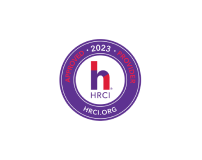Overview:
Companies are providing more fringe benefits to employers more than ever before, thus reduces company cost but raises employee morale. Because of the IRS has more to say on what Fringe Benefits are taxable and what are not. The IRS for non-taxable fringe benefits puts a lot of regulation around how the fringe benefit is given and when that also determines if a thought non-taxable item may end up being taxable.
As a payroll professional you must know cold—no guessing—when a fringe benefit is taxable and when it is not, when it is reportable and when it is not. Payroll must know when providing a fringe benefit must be considered wages or if it is “tax free”. What if the employee pays some of the cost of a fringe benefit? How does that affect taxing and reporting? Are there dollar limits? Does it become taxable after a certain amount? And after you have mastered all the facts along comes a new tax bill by Congress that can change everything you just learned when it comes to taxing fringe benefits.
All fringe benefits must be handled correctly, under the latest rules, to minimize the chance for penalties and interest to be levied against your company or for triggering larger and more intrusive governmental audits.
Areas covered in this Training:
• Review FMV (Fair Market Value) and how the IRS determines it.
• Discussion on No additional cost services, employee discounts, working condition Fringe Benefits & De minimis Fringe Benefits.
• Transportation Fringe Benefits - Review qualified transportation benefits
• How to calculate the taxable wages for the personal use of a company vehicle
• Discuss several excludable fringe benefits such as Retirement planning, athletic facilities, achievement awards etc.
• Discuss Fringe Benefits that should be taxable
• Review Moving/Relocation Expenses
• Working Condition Fringe Benefits
• De Minimis Fringe Benefits
• Review executive taxation items, like spousal travel. Company aircraft usage etc.
• Once a benefit is determined taxable, how to handle it
• Brief overview of how to handle any Fringe Benefits that AP pay.
• Review of at home office amounts for remote workers
• IRS ruling on cell phones
• Educational assistance programs and taxation
Why Attend this Training:
After attending this webinar, you will walk away with a better understanding of the IRS view on fringe benefit taxation. The details of the IRC exceptions allowed by the IRS will be detailed and explained to participants. You will be able to better identify and calculate the fair market value of fringe benefits for taxation purposes. You will get in-depth knowledge on-
• IRS rules for taxation of Fringe Benefits
• How to calculate the value of a noncash fringe benefit
• Review of excludable fringe benefits
• Details of how the tax cuts and jobs act impacted fringe benefits
• Procedures for recording fringe benefits
• Year-end best practices for fringe benefit taxation
Suggested Attendees:
• Payroll Professionals
• HR professionals
• Accounting Personnel
• Business Owners
• Attorneys/ Legal Professionals
• Operations and Departmental Managers

Dayna Reum
Dayna is currently the Director of Payroll Operations at Ann & Robert Lurie Children’s Hospital of Chicago. Dayna has been heavily involved in the payroll field for over 17 years. Starting as a payroll clerk at a small Tucson company, Dayna moved on to be a Payroll Team Leader at Honeywell Inc. During Dayna’s time at Honeywell she obtained her FPC (Fundamental Payroll Certification) through the American Payroll Association. She also received several merit awards for Customer Service and Acquisitions and Divestitures.
Dayna is no stranger to teaching she has taught at the Metro Phoenix American Payroll Association meetings and at the Arizona State Payroll Conference. Topics including Payroll Basics, Global/Cultural Awareness, Immigration Basics for the Payroll Professional, Multi-State and Local Taxation and Quality Control for Payroll, International and Canadian payroll. Dayna has her CPP (Certified Payroll Professional) through the APA. She also serves on the National American Payroll Association on the National Strategic Leadership Task Force, Government Affairs Task Force (PA Local tax subcommittee). Dayna has received a Citation of Merit for her service along with being a Gold Pin member of the APA. Besides her payroll accomplishments, Dayna is certified in HR hiring and firing practices and is a Six-Sigma Greenbelt.

SHRM -
Stand Eagle is recognized by SHRM to offer Professional Development Credits (PDCs) for the SHRM-CPSM or SHRM-SCPSM. This program is valid for 1.0 PDCs for the SHRM-CPSM or SHRM-SCPSM. For more information about certification or recertification, please visit - portal.shrm.org.

HRCI -
This webinar has been approved for 1.0 HR (General) re-certification credit hours toward California, GPHR, HRBP, HRMP, PHR, and SPHR recertification through the HR Certification Institute.
The use of this seal is not an endorsement by the HR Certification Institute of the quality of the activity. It means that this activity has met the HR Certification Institute’s criteria to be pre-approved for re-certification credit.

NASBA -
StandEagle is registered with the National Association of State Boards of Accountancy (NASBA) as a sponsor of continuing professional education on the National Registry of CPE Sponsors. State boards of accountancy have final authority on the acceptance of individual courses for CPE credit. Complaints regarding registered sponsors may be submitted to the National Registry of CPE Sponsors through its web site: www.nasbaregistry.org.

ACCREDITATIONS


